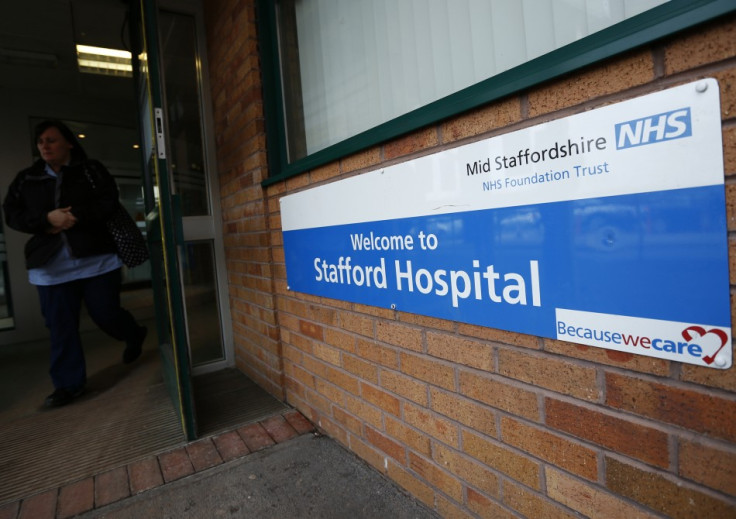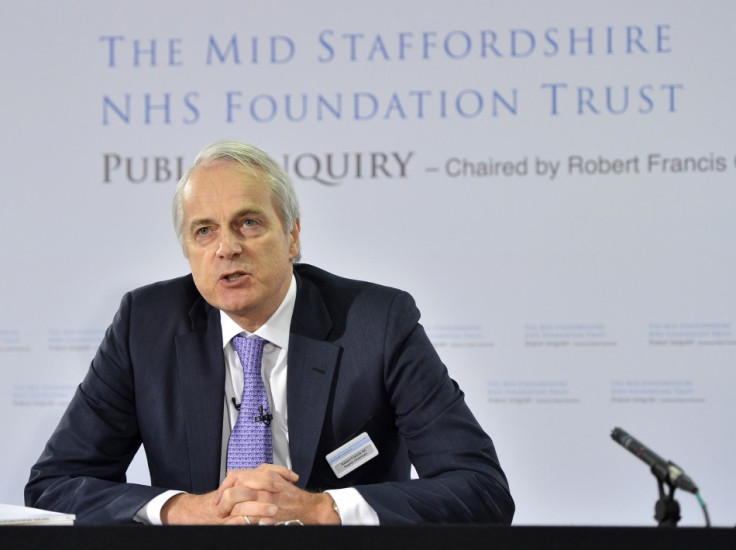Mid Staffordshire Scandal: Families Call for NHS Resignations at the Top

The families of some of the 1,200 patients who died at Stafford Hospital as a result of poor care, have called for resignations at the top of the NHS.
The £13m report by Robert Francis has called for a "fundamental change" across the NHS and a "zero tolerance" approach to poor standards of care in the health system. He labelled the hospital's standards as "appalling".
The inquiry was looking in to why hundreds of people died at the Mid Staffordshire NHS Foundation Trust hospital between 2005 and 2009 and many more experienced "appalling and unnecessary suffering".
While not blaming one specific area of group of individuals, Francis declared the hospital had failed for so long as there was an "institutional culture in which the business of the system was put ahead of the priority that should have been given to the protection of patients" and criticised the trust for not responding to the "numerous" warning signs.
Following the release of the report, which carried 290 recommendations on how to improve NHS standards at all levels, one victim's family demanded resignations at the top.
Julie Bailey, head of Cure the NHS, whose mother died at the hospital, said NHS chief executive Sir David Nicholson should resign along with Royal College of Nursing chief executive Peter Carter.
She said: "We don't want a bully at the top of this organisation, we want a leader who will inspire and guide the staff on the front line.
"Sir David Nicholson needs to resign today. Peter Carter needs to resign today, he has failed the front line.We want resignations, we are going nowhere. We have lost hundreds of lives within the NHS, we want accountability.
"Everything in this report is what we need, this will give patients power.
"But it needs a leader to take that forward, and David Nicholson is not that leader."
Union support
Britain's largest trade union, Unite, backed Bailey's for the resignation of Nicholson. Rachael Maskell, the union's health officer, said: "Sir David Nicholson, who has thrown down the so-called Nicholson challenge of £20bn cuts, is not the person to lead the NHS into the world of patient-focused care as outlined by Robert Francis.
"A complete overhaul of dysfunctional management in the NHS needs to happen as a matter of urgency and the first person out the door should be Sir David Nicholson, chief executive of the NHS commissioning board - perhaps the most powerful person in the coalition's new NHS."
Health secretary Jeremy Hunt added he felt it was "wrong" that no-one has been held responsible for the hundreds of deaths at the hospital.
He told Sky News: "It closed ranks, whistleblowers were bullied, the primary care trust didn't know what was going on, the strategic health authority failed, my own Department of Health failed.
"The point about criminal prosecution, which I think most people feel, is that perhaps more than 1,000 people died because of poor care. No one has been brought to book and that feels wrong."

The chief executive of Mid Staffordshire NHS foundation trust, Lyn Hill-Tout, said: "We apologise unreservedly that the board at Mid Staffordshire Foundation Trust and individuals working for the trust failed in their primary responsibility to keep all patients safe and to care for patients with the compassion and dignity they deserved."
Mike Farrar, NHS Confederation chief executive, said the NHS must repair damage. He called it a "sad and shameful day" for the NHS.
He said: "This is a hard-hitting but fair analysis of what happened in Mid Staffordshire and that is exactly what we needed.
Mr Farrar added: "We owe it to every patient, family member and carer to commit to making sure these sorts of tragedies do not happen again."
Farrar previosuly said the publishing of this report would be one of the "darkest days" in NHS history.
Speaking as the report was published, Francis said: "This is a story of appalling and unnecessary suffering of hundreds of people. They were failed by a system which ignored the warning signs and put corporate self-interest and cost control ahead of patients and their safety.
"There was a lack of care, compassion, humanity and leadership. The most basic standards of care were not observed, and fundamental rights to dignity were not respected.
"What is required now is a real change in culture, a refocusing and recommitment of all who work in the NHS - from top to bottom of the system - on putting the patient first."
© Copyright IBTimes 2024. All rights reserved.






